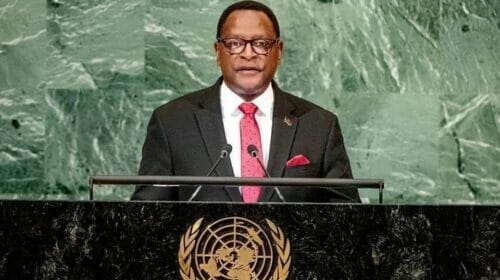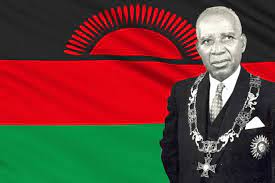Z Allan Ntata’s Uncommon Sense: Who Will Really Benefit from a Lockdown

By Z Allan Ntata
There is no doubt that the Covid-19 pandemic caused by the Coronavirus is a serious health threat that requires serious and sometimes unprecedented responses from those governing us as well as from the citizenry. If you follow the thoughts and comments of many commentators, you would quickly see that people value their life so much that they are readily prepared to do anything – and take anything from their government – as long as it is deemed necessary for the preservation of their life. It is in the face of this knowledge that an unscrupulous government can quickly seize on that popular fear of death to use it to trample on the people’s other rights unnecessarily.
In my Uncommon Sense, as deadly and life-threatening as the pandemic is, for those of us concerned with the fine balances of governance, however, the seriousness of the pandemic does not in any way negate the need to pursue the question whether it is possible for a beleaguered government to use the Covid-19 pandemic for political advantage and to suppress a popular need and activism for change.
Very strict measures aimed at controlling the spread of the Coronavirus were announced in Malawi by the government recently. They are measures that essentially ensure that there will be no more political or social activity. Under the theme of social distancing, the Peter Mutharika administration has taken advantage of the pandemic to ensure that the popular voices of displeasure with his administration, which previously could be heard from every political rally podium, and were being exchanged in pubs and night clubs, have been properly silenced.
Amidst protests and criticism from admittedly very few quarters, government apologetics have been quick to defend the strict social distancing rules which some have referred to as a “Lockdown”. The argument is that the president and the government are entitled to order such measures because when it comes to an unprecedented pandemic of this kind it is better to err on the side of caution and be guilty of overreacting and doing too much rather than doing too little and losing lives in the process. And of course, those commentators keen to get popular approval have sided with this thinking, seeing an opportunity to harness their popularity and perhaps also the opportunity to be identified as being politically neutral and non-partisan.
This keen desire to sound good and be popular and to come across as a balanced thinker, however, is in my mind probably what has prevented many of these commentators from looking at the coronavirus issue – and especially the Peter Mutharika’s response to it – dispassionately and objectively.
Because obviously no-one hates a person who comes to give you instructions on how to save your life, many have jumped of the bandwagon of the life-preservation argument without fully considering the issues, and without weighing the government’s actions fully, bearing in mind that the government itself knows this same fact and could use it for its own political advantage.
Malawi in one of the countries that registered confirmed cases of the Covid-19 relatively late on compared to other countries. For a disease that was making the rounds elsewhere and making headlines for over a month before it was actually confirmed here, the Peter Mutharika government seems to have somehow been taken by surprise, don’t you think? How could this be? The reaction from Mutharika has been impulsive and haphazard, and the measures taken have not really been those weighed against the specific considerations of the Malawian situation. Instead, what we have seen is that the Mutharika administration has simply been copying what other countries have been doing.
Now for a poor country like Malawi, there can be no demonstration of bad leadership, even in the face of a dangerous pandemic like the Covid-19, then simply copying and pasting measures that have been implemented by rich countries.
The decision to close down the borders, for instance, was taken too late, because our government was watching what other countries were doing instead of listening to our own experts familiar with the Malawian situation. The lockdown orders given now as a response to rising numbers of confirmed cases is also simply a matter of copying and pasting without thinking carefully of what the effects and indeed even the benefits of such a lockdown may actually be. “Other countries are doing it. We need to do it as well. After all, it will help us politically. No-one will protest since everyone is scared and afraid for their lives”, seem to me to have been the reasoning here.
In the rich countries where a lockdown like the one copied and pasted has been implemented, the government has made ancillary orders to help people deal with the hardships that result from being unable to work. Some government have provided funds to be given to people as nominal salaries during the lockdown, some have ordered suspension of billing for utilities such as water and electricity and some have even ordered landlords not to collect rent or to be lenient with their tenants regarding rental collections until the pandemic has passed over. President Mutharika and his administration know very well the hand-to-mouth nature of most of the Malawian working classes and yet, while quickly copying what other countries are doing, they have failed to recognize the need to mitigate for the hardships that the copied measures will cause.
It is this kind of leadership, these kinds of decisions, that makes me question whether any of these decisions are being taken for the benefit of Malawians at all, or whether the virus is being used as a scapegoat for political expediency. As a matter of fact, this has been my questions ever since the constitutional court ruled that Peter Mutharika was not legally and legitimately voted in as president in that May election last year.
The questions that always burns in my mind this: Can a person that has been declared by the courts to be holding the presidential seat illegally be trusted to make any decisions on the basis of what is good for the country? Wouldn’t such a person use any excuse, any trick, any means available to hold on to the power regardless of whether this hurts the country?
Is this not really the thinking behind all these copied Covid-19 orders – the thinking that if everything stops, especially the politics and the elections, and we can blame it on the corona virus, then we are home and dry?
The Covid-19 pandemic is deadly. Make no mistake about that. But do we really have enough faith and is there enough integrity and concern for the nation in Peter Mutharika for us to believe that their orders and decisions are being made for our benefit and not their own?
If the concern for the nation was paramount as they profess, wouldn’t they have found better solutions more suitable to the Malawian situation instead of simply copying and pasting ideas from other countries, ideas that are designed to cause everything to stop and ideas that are guaranteed to cause so much hardship to millions without any mitigation?
Fellow Malawians, is it not better to live one day as a lion than a thousand days as a sheep?
Z Allan Ntata is a Barrister of Middle Temple, Anti-Corruption & Governance specialist and author of Trappings of Power: Political Leadership in Africa. Currently an Independent consultant in Governance and Anti-corruption, Ntata has a diverse background from lecturing in law to acting as legal counsel to the president of Malawi
My Website: http://doctorzax.blogspot.com/




